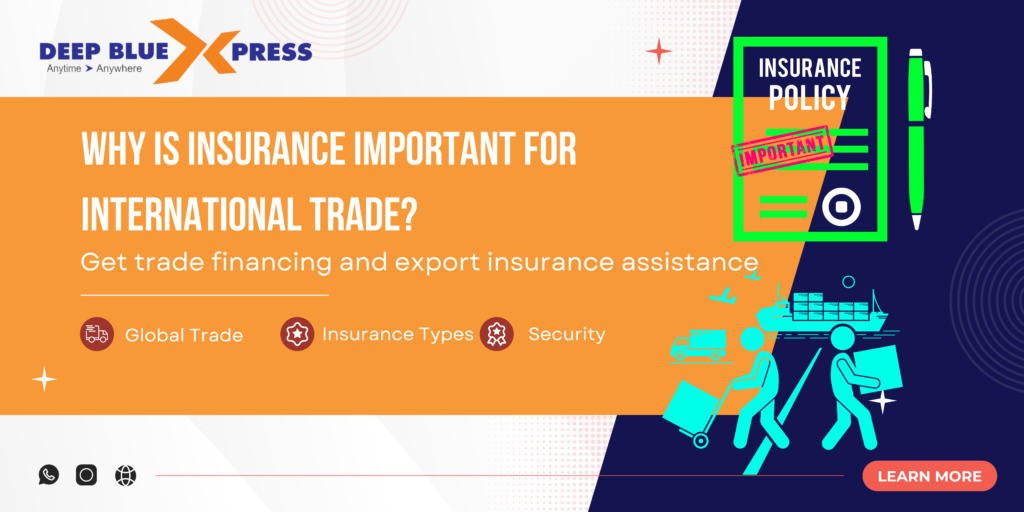What is international trade?
International trade is the transfer of products and services across national borders. It promotes the transfer of resources, talents, and technology between regions and countries. The end result is a complicated web of supply chains spanning continents, providing consumers with access to items that drive economic growth.
What are the challenges and risks in international trade?
Cross-border transactions can be complex and dangerous. Businesses that deal internationally confront numerous concerns, ranging from unpaid bills to geopolitical disasters. Insurance can help to mitigate some of these issues. From the moment a transaction begins, there may be concerns regarding the trustworthiness of a business partner, if the stipulated number and quality of goods will be shipped, when the goods will be received, and so on. Businesses should examine which risks are most likely to arise during any given transaction and weigh the costs and benefits of acquiring trade-related insurance.
Why is insurance important in trade?
Trade and commercial insurance are critical components of today’s competitive global economy. Trade insurance enables firms to implement a quality risk management strategy, whereas trade credit insurance protects enterprises from instability, client insolvency, and other credit risks. Various types of insurance coverage can protect your investment from specific events and difficulties.
What types of trade-related insurance are available and what do they cover?
Bonds are a financial commodity that guarantees payment for a transaction. It is a type of insurance in which an insurance company guarantees scheduled interest and principal payments on a bond or other security in the event that the bond or security’s issuer fails to make payments.
Credit insurance is a popular sort of trade insurance. Importers guarantee to exporters that they will pay them in full once the contractual terms are completed. If the buyer does not fulfil the contract and fails to pay, the insurance company compensates the seller.
Foreign exchange risk insurance is a forward transaction in which a contract is made with a financial institution to buy/sell currency on a specified date at a predetermined exchange rate. Financial firms provide this sort of insurance to reduce losses due to exchange rate changes.
Financial guarantees are legally binding, non-cancellable commitments made by banks or insurers to underwrite a contract and reimburse a receiver if its terms are not honored. Aside from safeguarding the exporter against nonpayment, guarantees can also protect importers from the danger that the supplier would fail to fulfil the contract.
Political risk insurance protects against the danger of the overseas government meddling in the investment, as well as the possibility of “political” events interfering with the transaction. The latter circumstance includes asset expropriation and the onset of violence. Although often sold separately, it is crucial to note that many credit insurance contracts include political risk coverage.
Product liability insurance protects against litigation if the product fails to meet national regulations.
Surety is a guarantee offered by a third party to compensate the loss incurred by one party in a contract in the event of total failure to perform the contract. In this instance, the third party bears responsibility for paying the contract.
Transit insurance, for cargo that is currently being transported, comprises:
- Marine cargo insurance covers the shipment of goods via a cargo vessel, including from ship to terminal.
- Air cargo insurance protects against the loss, damage, and, in some cases, delay of shipments via flight.
- Ground transport insurance provides supplementary coverage for products transported by road and rail. With few exceptions, this type of shipper is already responsible for delivering the product as received.
What are the most important elements to consider when picking a trade insurance provider and policy?
If you are involved in import/export operations, you are aware that trade insurance is critical for protecting your company from a variety of hazards, including nonpayment, currency fluctuations, political instability, and natural disasters. However, not all trade insurance companies and policies are alike. How can you select the best option for your requirements and budget? Here are some crucial considerations when choosing a trade insurance provider and coverage.
Coverage and exclusions: The first item to consider is the scope of the trade insurance policy’s coverage and exclusions. Depending on your sector, products, markets, and consumers, you may require various levels and types of security. For example, you might want to insure your goods against damage, theft, or loss in transit, or your receivables against default, insolvency, or political risks. You may also wish to insure your obligations, such as product liability, environmental liability, or contractual responsibility. However, certain policies may have exclusions or limitations for specific instances, such as force majeure, sanctions, fraud, or pre-existing disputes. As a result, you should carefully review the policy terms and conditions and compare them to your risk exposure and expectations.
Premiums and deductibles: The second aspect to consider is the trade insurance policy’s cost and calculation method. Premiums and deductibles are determined by a variety of factors, including the amount and volume of your shipments, your purchasers’ creditworthiness and payment terms, the destination and transit duration of your goods, the type and frequency of claims, as well as market circumstances and competition. You should compare quotes from several providers and note how they differ based on these parameters. You should also think about how premiums and deductibles impact your cash flow and profitability. For example, if you have a large cash reserve and a low claim history, you might choose a lower premium and a larger deductible, or vice versa.
Service and support: The third element to evaluate is the quality and availability of service and support provided by the trade insurance company. You want to collaborate with a provider who has a solid reputation, knowledge, and experience in your sector and markets. You also want to have access to trustworthy and responsive customer support, claims management, and dispute resolution. You should look at the provider’s ratings, reviews, and references from previous clients and partners. You should also test their communication channels, such as phone, email, chat, or portal, to check how responsive and helpful they are. You should also inquire about their value-added services, such as risk assessment, credit management, market information, and legal counsel.
Flexibility and customization: The fourth thing to examine is the level of flexibility and customisation provided by the trade insurance provider and policy. You want a policy that caters to your individual wants and tastes, rather than a one-size-fits-all approach. Look for a supplier who can customise the policy to your business model, product portfolio, customer base, and risk tolerance. You should also search for a provider who can adjust the policy to changing circumstances, such as new markets, new products, new customers, or new regulations. You should inquire about the policy’s options and features, such as single or multi-buyer coverage, short or long-term coverage, fixed or variable rates, and renewable or cancellable terms.
Compliance and security: The fifth element to evaluate is the level of compliance and security provided by the trade insurance provider and policy. You want to have a policy that adheres to the legal and regulatory standards of your business and markets. You’ll also want a policy in place to secure your data and privacy from unauthorised access or misuse. You should check the provider’s credentials, certificates, and accreditations from relevant agencies and groups. You should also look into the provider’s security policies, procedures, and systems, such as encryption, authentication, backup, or auditing. You should also inquire about the provider’s backup plans, such as alternate providers, policies, or emergency reserves.
Feedback and improvement: The sixth element to examine is the feedback and improvement that the trade insurance provider and policy offers. You want a policy that fulfils its promises and expectations. You also want a policy that evolves over time depending on your feedback and experiences. You should track the policy’s performance and satisfaction metrics, such as claim ratio, claim settlement time, customer happiness score, and renewal rate. You should also provide feedback and suggestions to the provider, such as areas for improvement, new requirements, or new opportunities. You should also get comments and recommendations from the provider, such as best practices, risk management techniques, or market trends.




